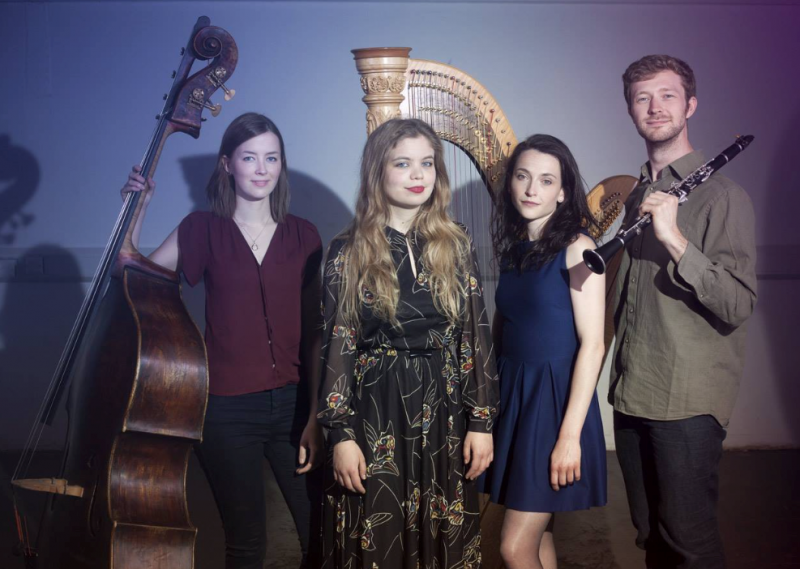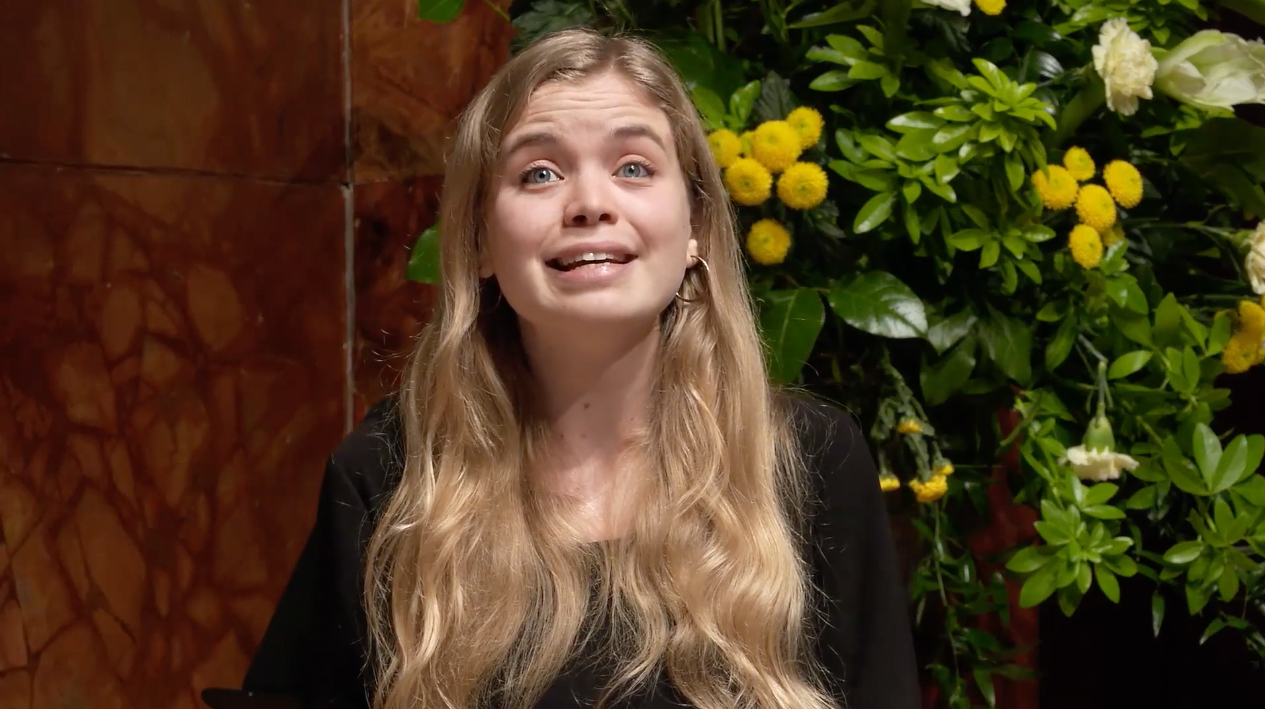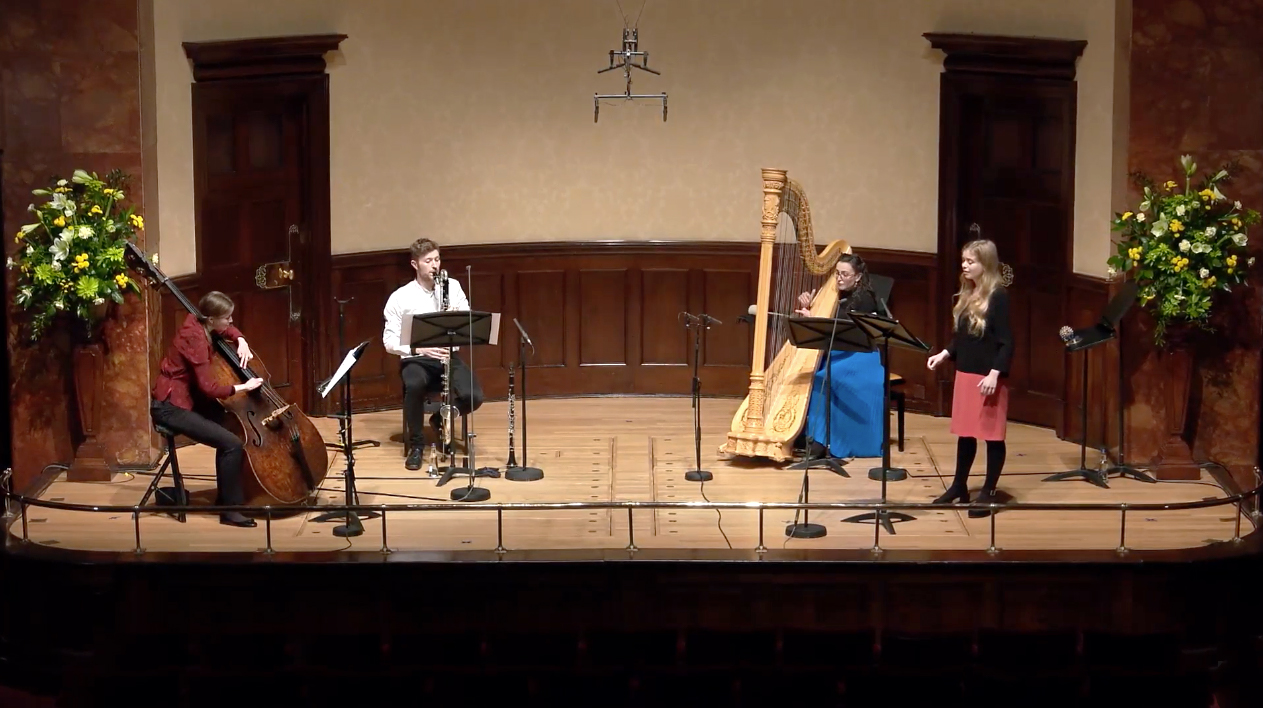The Hermes Experiment, Wigmore Hall online review - innovative and uplifting | reviews, news & interviews
The Hermes Experiment, Wigmore Hall online review - innovative and uplifting
The Hermes Experiment, Wigmore Hall online review - innovative and uplifting
Much exciting music being made by, and written for, this talented young quartet

Fast making a name for themselves in contemporary chamber music, The Hermes Experiment players here give a wonderful debut recital at the Wigmore Hall, With a range of pieces as eclectic as their line up – harp, soprano, double bass and clarinet – the quartet perform a multifarious array of works, from Lili Boulanger’s lilti
The recital opens with a new arrangement by soprano Héloïse Werner (pictured below) – who co-directs the group as well as singing in it – of Baroque composer Barbara Strozzi’s "Tradimento," from her 1659 work Diporti di Euterpe. The words of the piece focus on the emotions surrounding betrayal, and Werner’s arrangement incorporated improvisatory elements from the musicians, which heighten the sense of bewildering anxiety depicted in the text. Double-bassist Marianne Schofield’s arrangement of Anna Meredith’s Fin like a Flower, set to text by the artist Philip Ridley, has a gently bubbling accompaniment from the three instrumentalists beautifully matched with Werner’s rich soprano.  A piece recently composed for the group, Alex Mills’s Saṃsāra – named after a Sanskrit word meaning "endless wandering of the soul" – is set to both sacred Buddhist text, and a specially commissioned poem by Konstantinos Papacharalampos. As harpist Anne Denholm explains, the piece depicts the ‘full and endless cycle of earth, life, death and rebirth’. This is a deeply moving work, with stunning performances seen from all four musicians. The splashes of colour from the instrumentalists beautifully evoke the rain mentioned in the first section, "Morning," before moving into more vivid and driven passages. Werner – who also plays some hand-held percussion for this piece – sings with impeccable diction and a dusky, haunting tone.
A piece recently composed for the group, Alex Mills’s Saṃsāra – named after a Sanskrit word meaning "endless wandering of the soul" – is set to both sacred Buddhist text, and a specially commissioned poem by Konstantinos Papacharalampos. As harpist Anne Denholm explains, the piece depicts the ‘full and endless cycle of earth, life, death and rebirth’. This is a deeply moving work, with stunning performances seen from all four musicians. The splashes of colour from the instrumentalists beautifully evoke the rain mentioned in the first section, "Morning," before moving into more vivid and driven passages. Werner – who also plays some hand-held percussion for this piece – sings with impeccable diction and a dusky, haunting tone.
Freya Waley-Cohen’s song cycle We Phoenician Sailors, set to poetry by Octavia Bright, depicts a love affair in three movements, from initial infatuation to a bitter break up, with each piece distinctly evoking the emotions from the heady harp and clarinet flurries of the first movement to the juicily jarring bars of the last. The final movement of another song cycle, clarinettist Oliver Pashley’s arrangement of Helen Grime’s Council Offices is a moving portrayal of a woman’s traumatic memories of miscarriage.  Misha Mullov-Abbado ‘s The Linden Tree opens with a gorgeously simple harp and clarinet duo before the jazz-tinged double bass line joins in. Jazz influences abound, especially in Pashley’s brief cadenza finishing the instrumental interlude between verses four and five. Though the melody and lyrics are somewhat sad, depicting someone who has lost their lover in a war, the instrumental writing provides a touch of hope.
Misha Mullov-Abbado ‘s The Linden Tree opens with a gorgeously simple harp and clarinet duo before the jazz-tinged double bass line joins in. Jazz influences abound, especially in Pashley’s brief cadenza finishing the instrumental interlude between verses four and five. Though the melody and lyrics are somewhat sad, depicting someone who has lost their lover in a war, the instrumental writing provides a touch of hope.
The fact that The Hermes Experiment comprises such unusual mix of instruments, one not often written for, is proving to be a real blessing. The wealth of new music written for this group – a quartet still very much in its infancy – is already quite remarkable. I’m sure we can expect great things, not only from the quartet, but from those who have the privilege of writing for them.
rating
Explore topics
Share this article
Add comment
The future of Arts Journalism
You can stop theartsdesk.com closing!
We urgently need financing to survive. Our fundraising drive has thus far raised £49,000 but we need to reach £100,000 or we will be forced to close. Please contribute here: https://gofund.me/c3f6033d
And if you can forward this information to anyone who might assist, we’d be grateful.

Subscribe to theartsdesk.com
Thank you for continuing to read our work on theartsdesk.com. For unlimited access to every article in its entirety, including our archive of more than 15,000 pieces, we're asking for £5 per month or £40 per year. We feel it's a very good deal, and hope you do too.
To take a subscription now simply click here.
And if you're looking for that extra gift for a friend or family member, why not treat them to a theartsdesk.com gift subscription?
more Classical music
 From Historical to Hip-Hop, Classically Black Music Festival, Kings Place review - a cluster of impressive stars for the future
From quasi-Mozartian elegance to the gritty humour of a kitchen inspection
From Historical to Hip-Hop, Classically Black Music Festival, Kings Place review - a cluster of impressive stars for the future
From quasi-Mozartian elegance to the gritty humour of a kitchen inspection
 Shibe, LSO, Adès, Barbican review - gaudy and glorious new music alongside serene Sibelius
Adès’s passion makes persuasive case for the music he loves, both new and old
Shibe, LSO, Adès, Barbican review - gaudy and glorious new music alongside serene Sibelius
Adès’s passion makes persuasive case for the music he loves, both new and old
 Anja Mittermüller, Richard Fu, Wigmore Hall review - a glorious hall debut
The Austrian mezzo shines - at the age of 22
Anja Mittermüller, Richard Fu, Wigmore Hall review - a glorious hall debut
The Austrian mezzo shines - at the age of 22
 First Person: clarinettist Oliver Pashley on the new horizons of The Hermes Experiment's latest album
Compositions by members of this unusual quartet feature for the first time
First Person: clarinettist Oliver Pashley on the new horizons of The Hermes Experiment's latest album
Compositions by members of this unusual quartet feature for the first time
 Gesualdo Passione, Les Arts Florissants, Amala Dior Company, Barbican review - inspired collaboration excavates the music's humanity
At times it was like watching an anarchic religious procession
Gesualdo Passione, Les Arts Florissants, Amala Dior Company, Barbican review - inspired collaboration excavates the music's humanity
At times it was like watching an anarchic religious procession
 Classical CDs: Camels, concrete and cabaret
An influential American composer's 90th birthday box, plus British piano concertos and a father-and-son duo
Classical CDs: Camels, concrete and cabaret
An influential American composer's 90th birthday box, plus British piano concertos and a father-and-son duo
 Cockerham, Manchester Camerata, Sheen, Martin Harris Centre, Manchester review - re-enacting the dawn of modernism
Two UK premieres added to three miniatures from a seminal event of January 1914
Cockerham, Manchester Camerata, Sheen, Martin Harris Centre, Manchester review - re-enacting the dawn of modernism
Two UK premieres added to three miniatures from a seminal event of January 1914
 Kempf, Brno Philharmonic, Davies, Bridgewater Hall, Manchester review - European tradition meets American jazz
Bouncing Czechs enjoy their Gershwin and Brubeck alongside Janáček and Dvořák
Kempf, Brno Philharmonic, Davies, Bridgewater Hall, Manchester review - European tradition meets American jazz
Bouncing Czechs enjoy their Gershwin and Brubeck alongside Janáček and Dvořák
 Solomon, OAE, Butt, QEH review - daft Biblical whitewashing with great choruses
Even a top soprano and mezzo can’t make this Handel paean wholly convincing
Solomon, OAE, Butt, QEH review - daft Biblical whitewashing with great choruses
Even a top soprano and mezzo can’t make this Handel paean wholly convincing
 Two-Piano Gala, Kings Place review - shining constellations
London Piano Festival curators and illustrious friends entertain and enlighten
Two-Piano Gala, Kings Place review - shining constellations
London Piano Festival curators and illustrious friends entertain and enlighten
 Echo Vocal Ensemble, Latto, Union Chapel review - eclectic choral programme garlanded with dance
Beautiful singing at the heart of an imaginative and stylistically varied concert
Echo Vocal Ensemble, Latto, Union Chapel review - eclectic choral programme garlanded with dance
Beautiful singing at the heart of an imaginative and stylistically varied concert
 Scott, Irish Baroque Orchestra, Whelan, RIAM, Dublin review - towards a Mozart masterpiece
Characteristic joy and enlightenment from this team, but a valveless horn brings problems
Scott, Irish Baroque Orchestra, Whelan, RIAM, Dublin review - towards a Mozart masterpiece
Characteristic joy and enlightenment from this team, but a valveless horn brings problems

Comments
This was the best streamed